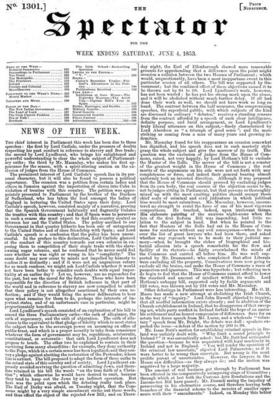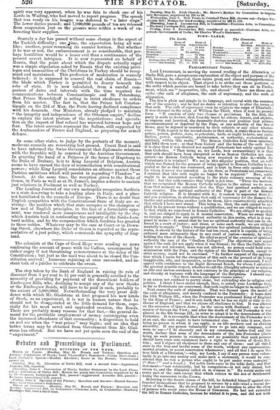NEWS OF THE WEEK.
THE chief interest in Parliament this week has been due to three speeches : the first by Lord Carlisle, under the pressure of doubts respecting his past conduct in reference to slavery and free trade; the second by Lord Lyndhurst, who brings his enlightened and powerful understanding to clear the whole subject of Parliament- ary oaths ; the third by Mr. Macaulay, who makes his first ap- pearance for the season, with a spirit-stirring oration on the ex- clusion of judges from the House of Commons.
The prominent interest of Lord Carlisle's speech lies in its per- sonal character, but it will also be found to possess a political importance. The occasion was a petition from certain ladies and others in Jamaica against the importation of slaves into Cuba in violation of treaties with this country. The petition was appro- priately presented to Parliament by the brother of the Duchess of Sutherland, who has taken the lead amongst the ladies of England in lecturing the United States upon their duty. Lord Carlisle's speech, however, consisted mainly of a narrative, proving that the Spanish Government habitually and flagrantly violates the treaties with this country; and that if Spain were to persevere in such a course she must expect to find this country neutral as between her and the -United States. The policy ascribed to our Government in that quarter hitherto has been one of antagonism to the United States and of close friendship with Spain ; and Lord Carlisle's speech is a confession that the policy has been unsuc- cessful. In the preface to this declaration, Lord Carlisle glanced at the conduct of this country towards our own colonies in ex- posing them to oompetition of their staple trade with the slave- owning sugar colonies, and he confessed that he never could feel sure whether he was right or wrong in his "complicity." The same doubt may now occur to minds not impelled by honesty to confess it so distinctly ; and if it were not an ungracious return for so much candour, we might ask Lord Carlisle whether it would not have been better to consider such doubts with equal impar- tiality at an earlier day ? Let us, however, use no reproaches for the past, but use the moral for the future. Those who have been responsible for the direction of British influence in that part of the world and in reference to slavery are now compelled to admit that their policy, is not altogether sanctioned by their own re- flection; and if they would bring the newer deliberation to bear upon what remains for them to do, perhaps the interests of im- portant states, and of an unfortunate race in particular, might be proportionately benefited.
Lord Lyndhurst's speech consisted of an explanation of his bill to amend the three Parliamentary oaths—the oath of allegiance, the oath of supremacy, and the oath of abjuration. The oath of alle- giance is the equivalent to that pledge of fidelity which in most states the subject takes to the sovereign power on assuming an office of public trust, and which is a proper security to take from conscience whatever the form of government may be, republican, aristocratic, constitutional, or autocratic : that oath Lord Lyndhurst does not propose to touch. The other two he explained to contain in their surviving form many absurdities : for example, they deny authority to the Pope, which in a certain sense has been legalized; and they con- vey a pledge against abetting the restoration of the Pretender, whose line is extinct. The bill proposed to adapt the form of these oaths to the actual state of this country and of society. Lord Lyndhurst ex- pressly avoided reviving the question of admitting Jews, and there- fore retained in his bill the words "on the true faith of a Chris- tian" ; which otherwise he would have desired to omit, because they tend to keep out the Jews by an indirect operation. But here was the point upon which the debating really took place. The Earl of Derby was afraid, on Tuesday night, that the Com- mons might by a very simple amendment strike out those words, and thus effect the object of the rejected Jew Bill; and on Thurs- day night, the Earl of Ellenborough showed more reasonable grounds for apprehending that a difference upon the point might occasion a collision between the two Houses of Parliament ; which would, unquestionably, have been a most inopportune event in this
particular session of all others. The bill was supported by Go- vernment; but the combined effect of these objections caused it to
be thrown out by 84 to 69. Lord Lyndhurst's work, however, has not been wasted : he has put his strong mark upon the abuse, and it will be abolished without much further delay. If all had done their work as well, we should not have work so long on hand. The contrast between the half measures, the compromising speeches, the superficial gabble, with which subjects of the kind are discussed in ordinary "debates," receives a standing censure from the contrast afforded by a speech of such clear intelligence, definite purpose, and lucid arrangement, as Lord Lyndhurst's truly liberal utterance on this subject,—finely characterized by Lord. Aberdeen as "a triumph of good sense "; and the more striking as coming from a man of many years and growing in- firmities.
Mr. Macaulay found for his reappearance an occasion somewhat less dignified, and his speech does not in such masterly style grasp the whole subject and give the marrow of its truth. The question was the exclusion of judges from the House of Com- mons, raised, not very happily, by Lord Hotham's bill to exclude the Master of the Rolls. The mover of the bill is not a senator of the greatest weight in the House of Commons ; the real merits of the arguments on his side were not set forth with any completeness or force, and indeed their general bearing almost uniformly took an inverted direction. Although it was proposed that the House of Commons should proceed by excluding judges from its own body, the real essence of the objection seems to be, not to judges sitting in Parliament, but that persons so thoroughly mixed up with the most exciting politics should occupy those chief seats of criminal and civil judicature in which political bias would be most calamitous. Mr. Macaulay, however, encoun- tered no strength to resist the force of one of his most vigorous compositions. He touched, indeed, upon irrelevantthings. His elaborate painting of the anxious night-scene when the fate of the first Reform Bill was impending, had little re- lation to the subject in hand. But when he pointed to the fact that Masters of the Rolls had sat in the House of Com- mons for centuries without any evil consequence—when he ran over the list of great lawyers who had been there, and asked whether any reproach was to be made to their judicial me- mory—when he brought the riches of biographical and his- torical allusion into a speech remarkable for the flow and facility of its rhetoric—he fairly overwhelmed the minds of the Commons and carried all before him. He was well sup- ported by Mr. Drummond ; who complained that after Liberals were excluding all the property, Conservatives were now going to exclude all the brains, and make the House of Commons a mass of pauperism and ignorance. This was hyperbole ; but reflecting men do begin to feel that the House of Commons cannot afford to lower the standard and amount of intellect within its walls. Lord Hotham's unhappy bill, supported only by feeble arguments and 123 votes, was thrown out by 224 votes and Mr. Macaulay.
Other debatings in Parliament were less interesting. Mr. G. Ti. Moore has made a new attempt at abolishing the Irish Church, in the way of "inquiry." Lord John Russell objected to inquiry, that all needful information exists already ; and to abolition of the Church-establishment in Ireland, that he disapproves of that sweep- ing act, while party conflict in Ireland forbids the hope of an amica- ble settlement and an honest compromise of differences. Save for an astute but fierce speech from Mr. Lucas, and a wholesale " volun- tary " speech from Mr. Bright, the debate was dull : speakers ex- pected the issue—a defeat of the motion by 260 to 98. Mr. Isaac Butt's motion for establishing criminal appeals in Ire- land was unfairly dealt with. "Why limit a sound principle to Ireland ? " it was sarcastically asked : but Mr. Butt had anticipated the question—because he was acquainted with legal machinery in Ireland and not in England. "You will render the operation of the criminal law uncertain," objected Lord Palmerston; as if it were better to be wrong than uncertain. But wrong is the most prolific parent of uncertainties. However, the lawyers in the House saw difficulties—as they always do; and the motion was negatived by a large majority.
The amount of real business got through by Parliament has been effected in the comparatively unimposing stage of Committee ; through which at last both the Customs Acts Resolutions and the Income-tax Bill have passed ; Mr. Disraeli seeing the =policy of persevering in his obstructive course, and therefore leaving both branches of the financial scheme to the mercies of smaller oppo- nents with their "amendments." Indeed, on Monday this better
spirit was very apparent, when he was fain to check one of his Lords in Waiting, who had moved to report progress. The speech that was ready on hie tongue waa deferred to "a later stage." The lower duties passed; and 7,000,000 pounds of tea are released from suspension just as the grocers were within a week of ex- hausting their supplies.



























